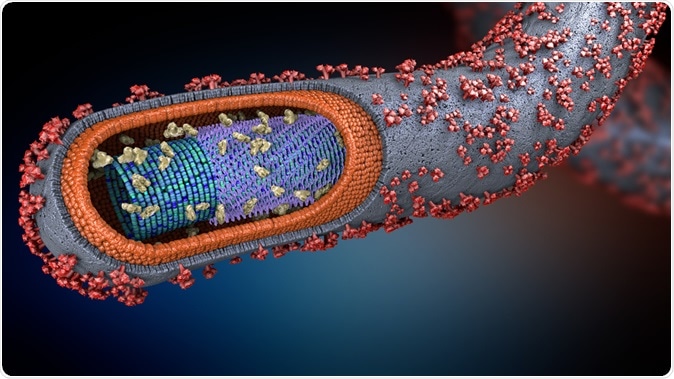Bunia is the second largest city in the Democratic Republic of Congo (DRC). This week (20th of March 2019), the Health Ministry confirmed a case of the highly fatal Ebola virus infection at Bunia. Bunia has a population of nearly one million and this announcement has sparked fear.

3d illustration of a cross-section of an ebola pathogen - Illustration Credit: Christoph Burgstedt / Shutterstock
According to the Health Ministry the patient is a six month old baby and the parents “appear to be in good health.” The cause for the infection in the baby is being actively investigated. Ebola virus commonly is transmitted by blood and other body fluids and cases in infants and children is relatively rare. Babies of infected mothers can contract the virus via breast milk or close bodily contact.
The UNICEF in a statement said that cases of Ebola in children under 5 years are on the decline. Its statement said, “While children and women used to be disproportionately affected by the outbreak, the representation of EVD-infected women, men, and children has become more balanced in the past two months.” In January around 50 percent of all the cases among children were those in children aged under 5. Now the numbers in under-fives is around 15 percent. Cases among women have also reduced from 62 percent in December to 54 percent in March.
Since last August, DRC is facing one of the worst Ebola outbreaks with over 600 deaths due to the disease. A further 12 new Ebola cases have been confirmed in North Kivu and Ituri provinces in the DRC. This brings the total count of cases to 980 which include 606 deaths. The last epidemic was seen in West Africa between 2013 and 2016 with over 11000 dead due to the virus. Ebola virus has a death rate of over 90 percent and symptoms include fever, fatigue, vomiting etc. Once contracted, the infection manifests within 2 to 21 days.
Ebola treatment centres in DRC aided by the World Health Organization and several other international bodies and manned and supported by Doctors without Borders (MSF) have been attacked by local gunmen in the disputed and war torn areas. The MSF have thus been forced to suspend their activities.
Director-General Tedros Adhanom Ghebreyesus, in a press conference held by World Health Organization (WHO) last week said that this new development of 12 cases shows a downward trend to the outbreak. DRC health officials were encountering around 25 cases per week. Half of all the cases recorded were in January, he added. WHO director of the health emergencies program Mike Ryan on twitter said that there has been a recent rise in the numbers of cases among families and close contacts of the cases.
Elhadj As Sy, the secretary general of the International Federation of Red Cross and Red Crescent Societies (IFRC) said that community awareness was the key. He said in a statement, “Communities are key to ending Ebola. Only with their engagement and active participation will we be able to stop this outbreak. Fear, resistance and even denial are often encountered when people are overwhelmed by shocks, hazards and epidemics; but they can be overcome building on community norms, values and social capital.”